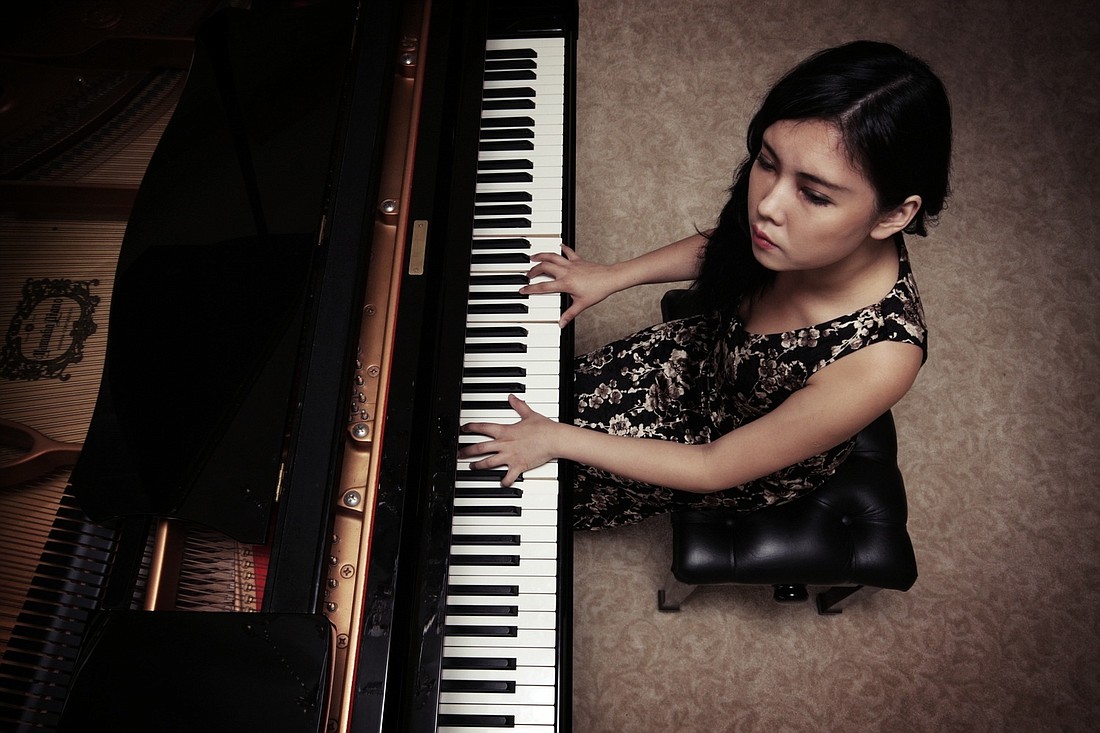- February 11, 2026
-
-
Loading

Loading

Most artists can see their creation come to life before their eyes. But when you’re a composer producing a work for a full orchestra, you need 30-plus musicians to experience your end product.
For young composers, finding a full orchestra is no easy task. That’s where EarShot comes in — an initiative of American Composers Orchestra in partnership with American Composers Forum, League of American Orchestras and New Music USA to identify and aid emerging composers.
On March 16, winning applicants Kitty Xiao, Krists Auznieks, Sam Wu and Nicky Sohn will hear their latest work played live by Sarasota Orchestra. We spoke to the four young composers to learn what the opportunity means to them.
Kitty Xiao, 29, is an Australian composer, pianist and collaborative artist based in Rochester, N.Y., as she completes a Master of Music — Composition at the Eastman School of Music.
She applied for EarShot not only to hear her piece, “Ink and Wash,” be performed, but for the chance to spend a week with likeminded young composers.
“I’m looking forward to making some friends in the music industry,” she says. “It’ll be really great to have conversations about their processes and if they’ve overcome any obstacles I’ve experienced myself.”
Xiao started composing “Ink and Wash” in early August/late July and finished the work in mid-October. She’s only heard it performed by a small group of fellow students at Eastman, so she says she has no idea what it will sound like when the Sarasota Orchestra plays it — but that’s half the excitement.
The piece is inspired by Chinese calligraphy, especially the work of Chinese contemporary artist Gu Wenda, and she describes its musical style as experimental and theatrical.
“There’s a display of energy in his (Wenda’s) intent .. I really like the way he uses the past tradition in new ways to question where we are socially presently,” Xiao says. “A lot of time my music is for me to try and understand something that I’ve experienced myself.”
Krists Auznieks, 27, is a New York-based Latvian composer pursuing a doctorate at Yale School of Music.
He says one of the biggest draws of the EarShot program was the chance to be mentored by professionals (each participant is given a mentor from Sarasota Orchestra to help them develop their piece both remotely before the trip and during their week in Sarasota), and the chance to eventually get feedback from not only the mentor composers but the conductor (Christopher Rountree), copyists and fellow participants.
His work, “Crossing,” has been performed once before at the Aspen Music Festival this past August, but he’s since done extensive editing.
The name of the piece comes from a term coined by American literary critic Harold Bloom who refers to “crossings” as rhetorical junctions, especially those that transport readers or listeners or viewers from one art form to another.
Auznieks says the “metabolism” of the piece is quite quick and constantly being reconceptualized as it’s being played.
“Hopefully because of that quick succession of places we start to wonder what exactly is the place we’re in or at and that prompts us to go beyond the physical realm of sound,” he says.
Sam Wu, 23, is an Australian citizen who grew up in Shanghai and is currently pursuing a Master of Music — Composition at The Juilliard School.
One of the several aspects of the EarShot experience he looks forward to is learning not just more about composing but about the behind-the-scenes aspects of how a professional orchestra operates through Q&A sessions with administrators.
Wu is fascinated by meteorology, and his piece, “Wind Map,” is a musical representation of a map of the earth’s wind patterns that he stumbled upon online.
“The swirls and lines reminded me a lot of (work by) Van Gogh,” he says. “There’s something about the very scientific and meteorological and also visually stunning aspects that inspired me.”
The piece has been recorded once by students at Juilliard, but never professionally.
Wu was diagnosed with an ear disorder last summer, so he says this piece is also highly personal because writing it after that diagnosis proves that despite his health issues, he can still write and pursue a career in music.
Nicky Sohn, 27, holds a holds a Master of Music diploma from The Juilliard School and splits her time between Berlin, New York City and her home of Seoul.
Known for her jazzy style influenced by icons such as Chet Baker and Bill Evans, Sohn says her work is often rhythmic and sometimes rooted in humor, but she also loves theatrical music.
Her EarShot piece, “Bird Up,” is inspired by the TV comedy skit of the same name on “The Eric Andre Show.” It’s a bizarre, chaotic program during which the host goes around New York pranking people, and she grew up watching it and thinking it was so pictorial and colorful, it would be interesting to capture in orchestral writing.
It was read twice at the Aspen Music Festival last summer, but she looks forward to hearing it performed by Sarasota Orchestra, a group she highly respects and has friends in.
So far she’s learned a great deal about not only the musical side of composing but the logistics of writing a clear piece that musicians can understand.
“It’s the best when musicians don’t have to spend so much time looking at parts and asking questions,” she says. “If we save time reading we can make the music flow better.”